Be Going To Statements ESL Games, Activities & Worksheets
Be Going To Practice
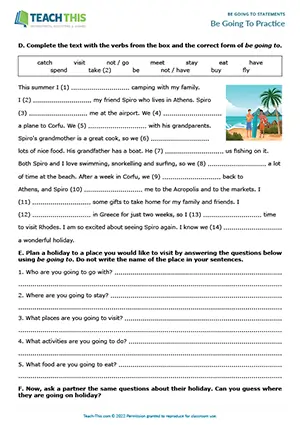
ESL Be Going To Worksheet - Grammar Exercises: Labelling, Gap-fill, Writing Answers - Speaking Activity: Freer Practice
This free 'be going to' worksheet helps students practice positive and negative 'be going to' statements about plans and predicitons. First, students label 'be going to' sentences as a prediction or...
Fortune Tellers
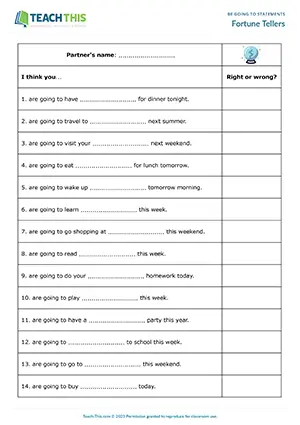
ESL Be Going To Game - Grammar and Speaking: Completing and Forming Sentences, Guessing, Controlled and Freer practice - Pair Work
In this engaging 'be going to' game, students practice affirmative and negative 'be going to' statements by predicting a partner's future plans. Without speaking to...
What are they going to do?
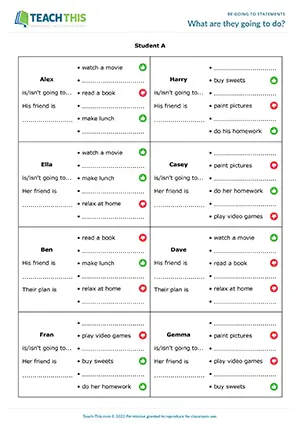
ESL Be Going To Activity - Grammar and Speaking: Information Gap, Making Statements, Identifying, Controlled Practice - Pair Work
In this 'be going to' speaking activity, students describe people's weekend plans using 'is going to' and 'isn't going to'. The aim of the activity is for the students...
How to Use Be Going To

ESL Be Going To Worksheet - Grammar Exercises: Gap-fill, Writing Sentences, Answering Questions - Speaking Activity: Freer Practice - Group Work
This useful 'be going to' worksheet helps to teach students how to use 'be going to' for future plans, intentions and predictions. To begin, students read about...
First Day of Work
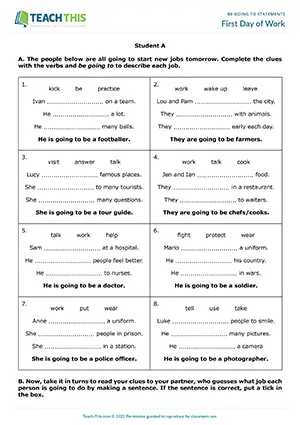
ESL Be Going To Game - Grammar: Gap-fill, Guessing, Forming Sentences - Pair Work
In this fun 'be going to' guessing game, students create clues for jobs that people are going to do for a partner to guess. To begin, students complete clues for each person's job using 'be going to' and the verbs provided. In pairs, students then...
I'm going to improve my English
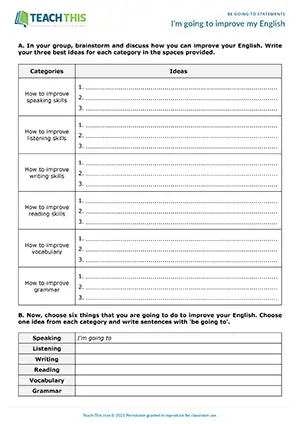
ESL Be Going To Activity - Grammar Exercise: Writing Sentences - Speaking Activity: Brainstorming, Discussion, Freer Practice - Group Work
In this free 'be going to' activity, students discuss and prioritize ways to improve their English and then write personal 'be going to' sentences about what...
Let's Party!

ESL Be Going To Activity - Grammar, Vocabulary and Speaking: Matching, Answering Questions, Writing Sentences, Presenting - Group Work
In this creative 'be going to' activity, students plan a party and then present their plans to the class. Students begin by matching party vocabulary to questions...
Prediction Dominoes
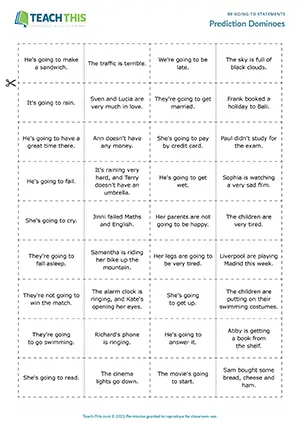
ESL Be Going To Predictions Game - Grammar: Matching - Group Work
In this 'be going to' predictions game, students play dominoes by matching predictions to situations and vice versa. The first player puts a domino down either before or after the domino on the table, making sure their situation or prediction...
What am I going to do?

ESL Be Going To Game - Grammar: Making Sentences, Guessing - Pair Work
In this entertaining 'be going to' game, students practice making and guessing 'be going to' statements about planned activities. In pairs, students take turns picking up a card and telling their partner one thing they are going to do before they...
What's in the bag?
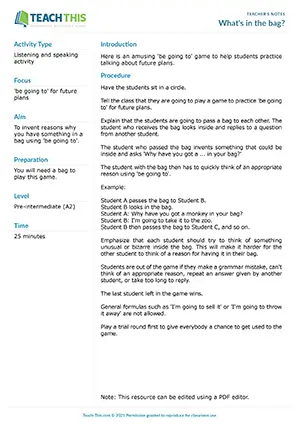
ESL Be Going To Game - Grammar: Forming Sentences
In this amusing 'be going to' for intentions game, students invent reasons why they have unusual or funny items in a bag using 'be going to'. Students sit in a circle and pass an empty bag to each other. The student who receives the bag looks inside...
You're going to...
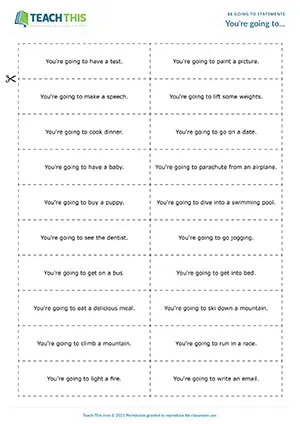
ESL Be Going To Game - Grammar: Miming, Guessing, Forming Sentences - Group Work
In this imaginative 'be going to' game, students watch mimes and guess what is going to happen next by making 'be going to' statements. A player from one team comes to the front of the class and is given a card. The player then mimes the...
Here's what our members are saying...
